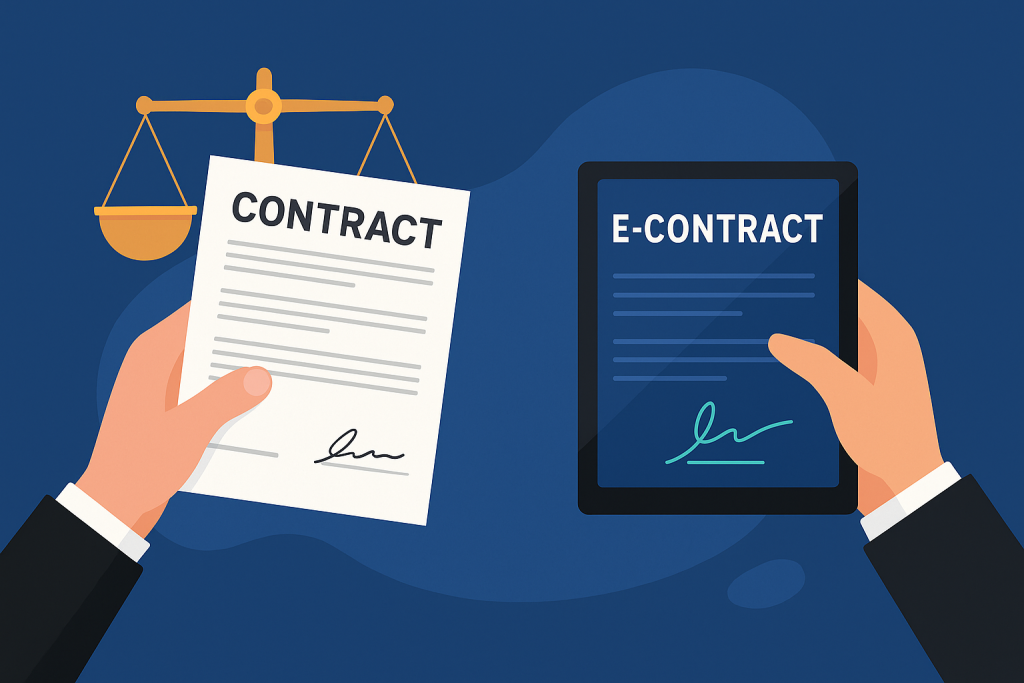
The rapid advancement of digital technology, the Internet, and e-commerce in the 4.0 era has fundamentally transformed the way contracts are concluded. Today, many transactions—such as the sale of goods, provision of services, employment agreements, and lease of assets—can be executed through electronic means such as email, websites, mobile applications, e-commerce platforms, or online systems.
In this context, determining the legal validity, conditions, form, and potential risks associated with electronic contracts has become increasingly crucial.
1. Legal Basis for Electronic Contracts
1.1. Definition of an Electronic Contract
According to Article 3 of the Law on Electronic Transactions 2023, several key concepts are defined as follows:
- “Electronic transaction” refers to a transaction conducted by means of electronic tools (Clause 1, Article 3).
- “Data message” means information created, sent, received, or stored by electronic means.
Although the 2023 Law does not explicitly define the term “electronic contract,” it can be interpreted as a contract formed online through data messages, using electronic means, based on mutual agreement between the parties, and in compliance with applicable legal conditions.
1.2. Legal Validity of Data Messages
Article 23 of the Law on Electronic Transactions 2023 provides that:
“An electronic signature shall not be denied legal validity solely on the ground that it is in electronic form.”
Therefore, if a contract is concluded in the form of a data message and satisfies technical and authentication requirements, it holds the same legal validity as a traditional written contract.
2. Conditions for an Electronic Contract to Be Legally Valid
To be recognized, an electronic contract must satisfy both general conditions under the Civil Code and specific conditions applicable to electronic transactions.
2.1. General Conditions (under the 2015 Civil Code)
Pursuant to Article 117 of the Civil Code 2015, a contract is valid if:
- The contracting parties have legal capacity and civil act capacity;
- The purpose and content of the transaction do not violate prohibitions or social ethics;
- The parties enter into the contract voluntarily; and
- The form of the contract complies with legal requirements (if written form is required).
Hence, an electronic contract can be considered a valid “written form” if it can be stored, accessed, and reproduced when necessary.
2.2. Specific Conditions for Electronic Transactions
Under the Law on Electronic Transactions 2023:
- A data message must ensure integrity, meaning its content has not been unlawfully altered;
- The authentication of the sender, recipient, and electronic means must be secure and appropriate to the level of risk;
- The electronic signature, digital certificate, and authentication services used must comply with statutory standards (Articles 23 and 26);
- The law also recognizes foreign electronic signatures and certificates, provided they meet Vietnam’s technical and legal requirements.
3. Legal Validity of Electronic and Digital Signatures
According to Article 23 of the Law on Electronic Transactions 2023:
- An electronic contract cannot be denied validity merely because it bears an electronic signature.
- A secure electronic signature or digital signature has the same legal validity as a handwritten signature in paper-based contracts.
- Where specialized laws require confirmation “in writing,” this requirement is deemed satisfied if the data message is signed using a secure or certified electronic signature.
This is further reinforced by guiding regulations such as Decree No. 48/2024/NĐ-CP, which amends Decree No. 130/2018/NĐ-CP on digital signatures and certification services (as referenced by VCCI).
4. Practical Application and Common Challenges
In practice, electronic contracts are now widely used in various sectors:
- Online sale of goods and services;
- Employment and labor contracts;
- Software and platform service agreements;
- Digital banking and e-commerce operations (e.g., Shopee, Lazada).
However, certain practical issues still persist:
- Difficulties in proving the authenticity of electronic signatures and verifying parties in disputes;
- Limited awareness among businesses and individuals regarding the legal validity and proper storage of electronic contracts;
- Some transactions remain excluded from electronic contracting—such as land use, inheritance, and marriage—under the former Law on Electronic Transactions 2005 (Article 1), which is currently being reviewed under the new law.
5. Observations and Recommendations
Observations
An electronic contract has the same legal validity as a traditional written contract if it is concluded in compliance with the Law on Electronic Transactions 2023 and relevant specialized laws.
Recommendations
- Businesses and individuals should store electronic contracts on secure and reliable platforms, use legally recognized digital signatures, and ensure information security;
- The State should issue detailed implementation guidelines for the 2023 Law to prevent overlap with other legal frameworks;
- Increase public awareness of the legal validity of electronic contracts and digital signatures;
- Closely manage excluded transactions and those requiring special procedures under sector-specific laws.
6. Conclusion
In the era of digital transformation, the use of electronic contracts is no longer just a trend—it has become a legitimate and official form of legal documentation.
However, the key issue is not merely whether such contracts are “legal,” but whether the parties can prove and maintain the authenticity and integrity of data in case of disputes.
When properly implemented in accordance with the law, electronic contracts can significantly reduce transaction time and costs while improving efficiency. Conversely, a lack of caution or compliance may lead to legal risks and potential loss of rights.
📞 CONTACT LEGAL CONSULTANT:
TLA Law is a leading law firm with a team of highly experienced lawyers specializing in criminal, civil, corporate, marriage and family law, and more. We are committed to providing comprehensive legal support and answering all your legal questions. If you have any further questions, please do not hesitate to contact us.
1. Lawyer Vu Thi Phuong Thanh, Ha Noi Bar Association
Email: vtpthanh@tlalaw.vn
2. Lawyer Tran My Le, Ha Noi Bar Association
Email: tmle@tlalaw.vn
Khuong Ngoc Lan

